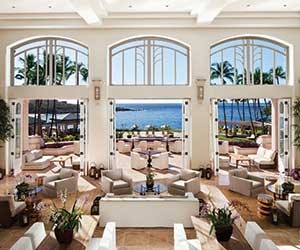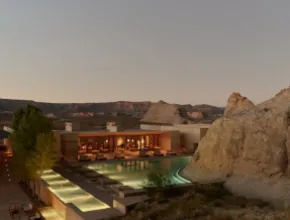Corporate social responsibility, aka CSR, is hotter than ever, serving up an expansive menu of options to groups seeking to give back.
Where this type of activity was once limited to experiences like helping build a home for a deserving family in need, or constructing bicycles for underprivileged children, CSR today is being offered in countless locales and in innumerable ways.
One appealing setting to make a difference in is along the coast, where organizations, destinations and properties offer group-friendly ways to make the world a better place, one grain of sand at a time.
Here’s a look at some of the very best possibilities for coastal CSR.
Helping Out on Hilton Head
While South Carolina’s Hilton Head Island is a highly regarded oasis of swimming, golfing and other active fun, groups seeking to do something more meaningful now have a flexible and customizable way to give back without massive planning involved.
“We have a corporate social responsibility program called the Hilton Head Island Difference,” says Charlie Clark, vice president of communications for the Hilton Head Island-Bluffton Chamber of Commerce. “It’s turnkey—groups can choose from two-hour, four-hour or full-day experiences. Groups like to do things indigenous to our area such as the reclamation of oyster beds or working with the coastal discovery museum to maintain their exhibits. The bureau does everything from providing transportation and t-shirts to setting up lunch.”
Projects can incorporate groups from 10 to 100 people, and the program package includes transportation and work-related supplies; optional extras can include items like boxed lunches, souvenir t-shirts and a video with your team in the starring role.
The Science of Giving Back
On Tybee Island, Ga., the island’s Marine Science Center offers groups ways to make a difference while also learning quite a bit about the indigenous flora and fauna of the region.
“Our groups explore the rich diversity of coastal Georgia’s ecology on the beach, in the marsh, on the water, and in our classroom with marine science educators,” says Cody Shelley, communications director for the facility. “We work to connect our island visitors with the role they can each play in conservation and stewardship through educating about everything from marine debris to protecting our endangered sea turtles.”
Its Authentic Coastal Experiences (ACE) are modular two-hour programs custom-created for a group’s needs and interests. Marine science educators direct groups as they explore the plant and animal life of Georgia’s coastal habitat. ACE programs are offered year-round, seven days a week, and can accommodate up to 90 participants at any given time, with the cost based on the number of participants. PageBreak
Virginia Beach Bonding
Launched in the fall of 2012, Virginia Beach, Va.’s One Beach, One World program allows for visiting attendees to assist the area in a number of ways.
“One Beach, One World gives meeting planners an opportunity to do more than just meet; it gives them a chance to positively impact the Virginia Beach community,” says Teresa Diaz, social media manager and CSR coordinator for the Virginia Beach CVB. “Their presence is felt here long after the meeting is over; they’ve made a difference.”
The new program works with local groups to offer a variety of CSR options, with a focus on six topics that include fighting homelessness, hunger and domestic violence; helping youth and the elderly; supporting our armed forces; environmental restoration and protection; general community service; and international outreach.
Mass Support
Out on Cape Cod in Yarmouth Port, CARE for the Cape & Islands works with the local lodging industry to help groups give back in a variety of fashions.
“There is a wide range of activities to choose from, including beach cleanups, monitoring wildlife or helping to make local bike and walking trails cleaner and safer,” says spokeswoman Jill Talladay. “For example, visiting groups have helped collect and log marine debris while learning about the ocean’s environment, aided by knowledgeable staff from the Provincetown Center for Coastal Studies and Cape Cod National Seashore.”
Lending a Hand in Hawaii
Animal-loving attendees will savor the Adopt-a-Monk Seal program, recently created by the Four Seasons resorts on Lanai in partnership with the Monk Seal Foundation. The program benefits the critically endangered Hawaiian monk seal, and was designed to create awareness, funding and invaluable protection.
“It provides a unique group offering that is both culturally appropriate and eco-conscious; the Hawaiian monk seal is the only seal native to Hawaii, thus directly complementing our authentic, genuine and Hawaiian experiences unique to Lanai,” says Tom Roelens, general manager. “More importantly, it gives back to the Hawaiian community and assists with conservation efforts.”
Various group doings to protect the endangered critters include monk seal counts that document the seal population.
“Another [CSR] option is our ‘Palms to Pines’ concept of assisting with conservation efforts near the ocean and then planting trees up at Koele,” Roelens says.
Assisting With Access
Access Destination Services has a wide-reaching presence that makes it easy for coastal groups all around the U.S. to use its services.
“Access Destination Services has multiple offices on both coasts of the U.S.,” says CEO Chris Lee. “This makes it easy for us to create custom-designed CSR programs for our clients that take advantage of our proximity to these beautiful coastlines.”
One singular example of its many offerings is a group experience at the Pacific Marine Mammal Center in Laguna Beach, Calif. Guests partake in a hospital tour, converse with the attending physician, and provide hands-on animal care. There’s also the opportunity to adopt rehabilitating animals and witness their happy release back into the Pacific Ocean.
Ritzy Responsibility
The Ritz-Carlton group offers CSR experiences of all kinds under its Community Footprints program, which has been making a difference since 1983. The program covers everything from helping with childhood literacy and combating poverty to environmental support.
One example is an effort at The Ritz-Carlton, Laguna Niguel in Southern California helping to restore the natural habitat of the Dana Point Preserve. Groups can work on trail maintenance, restore plants and remove invasive plant life, among other options. While the outings serve to preserve nature, they also help maintain a healthy ecosystem for threatened animal species like Pacific pocket mouse and the coastal California gnatcatcher—a small songbird—in addition to endangered plants.






